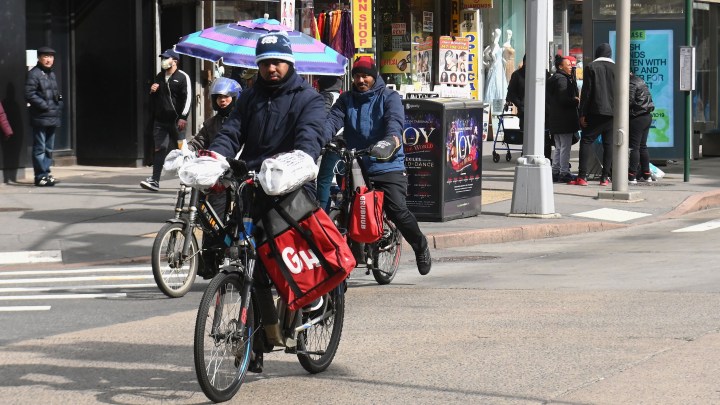
NYC passes new protections for delivery app workers

New York City, one of the biggest markets for app-based food delivery, passed new laws on Thursday that set minimum working standards for delivery app workers. They define rules for both app companies and restaurants around pay, delivery zones, breaks and more.
This is a milestone for gig workers like Andrew Wolf, who said his most frustrating delivery involved picking up food that … didn’t exist. A customer ordered a seasonal item that the restaurant forgot to take off the menu.
“I spent an hour-and-a-half dealing with this, and because the order got cancelled I only got paid $4, I think,” he said.
Wolf’s regular job is as a professor of sociology at the City University of New York — he worked for delivery apps for research. Wolf wanted to call someone for guidance on the missing food, but he said he didn’t have a supervisor, because delivery workers are independent contractors.
“You know, these companies say you’re free because you don’t have a boss. But having a boss actually solves problems,” Wolf said.
Delivery companies say that workers have the freedom to work their own hours, or decline orders, though Wolf pointed out there were often penalties for workers who do. The new measures in New York City set standards for delivery distances and minimum payments per order. The laws also establish fines for businesses that won’t let delivery people use their bathrooms.
Customers are finally realizing that ordering on apps has an impact, “that there’s actually a cost for my cheap food, that there’s actually a cost for my 24-hour delivery,” said Patricia Campos-Medina at Cornell’s The Worker Institute. “And workers realized that they had the power to demand more.”
This is just the start, said Ligia Guallpa of Workers Justice Project. “This will set an example for the rest of the country, but at the same time will move workers to start mobilizing, not only in New York City, but across the state,” she said.
DoorDash, the largest online food delivery service, opposed the measure, but said it would work with New York City officials to identify ways to support delivery workers.
There’s a lot happening in the world. Through it all, Marketplace is here for you.
You rely on Marketplace to break down the world’s events and tell you how it affects you in a fact-based, approachable way. We rely on your financial support to keep making that possible.
Your donation today powers the independent journalism that you rely on. For just $5/month, you can help sustain Marketplace so we can keep reporting on the things that matter to you.

















